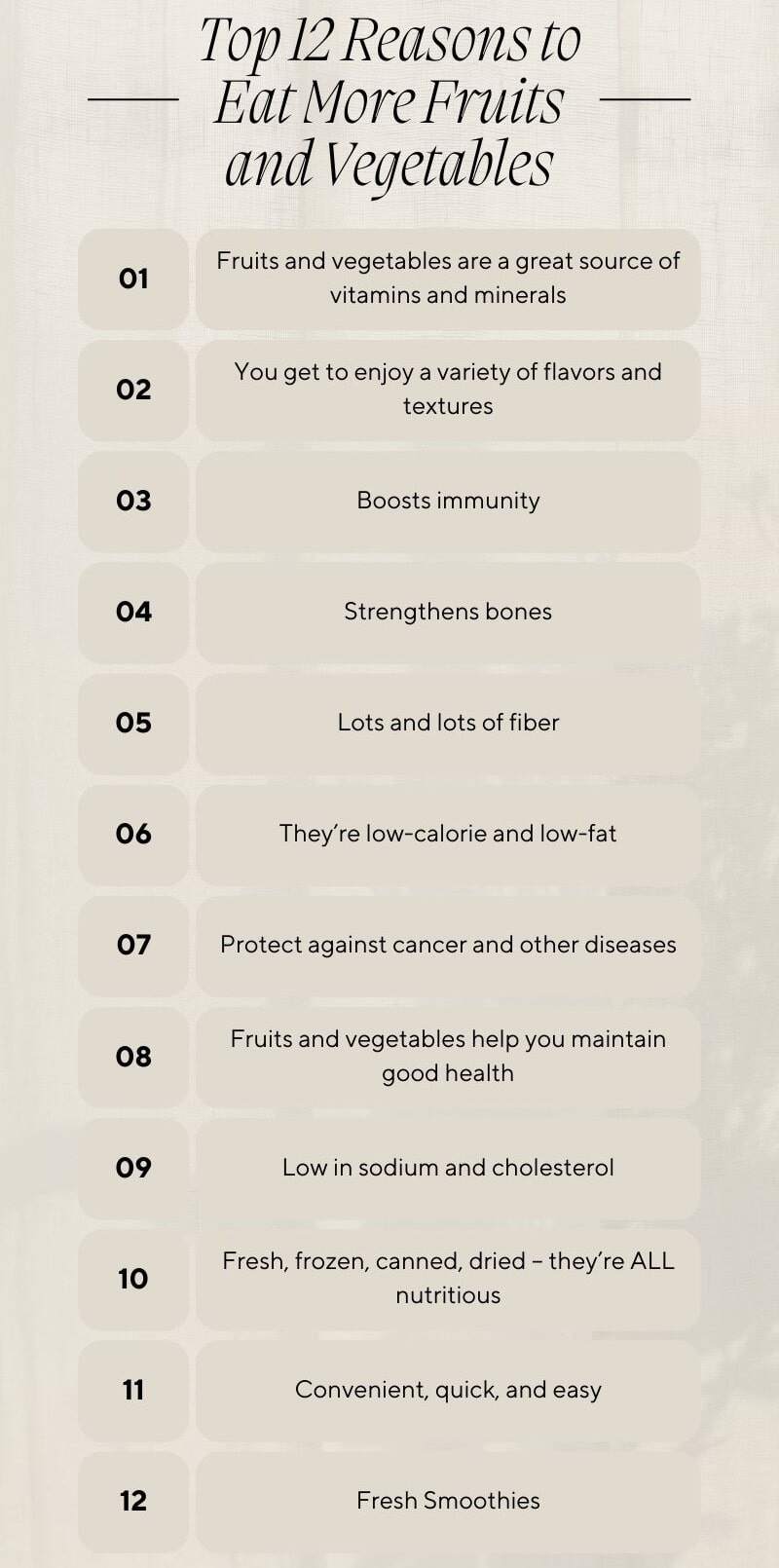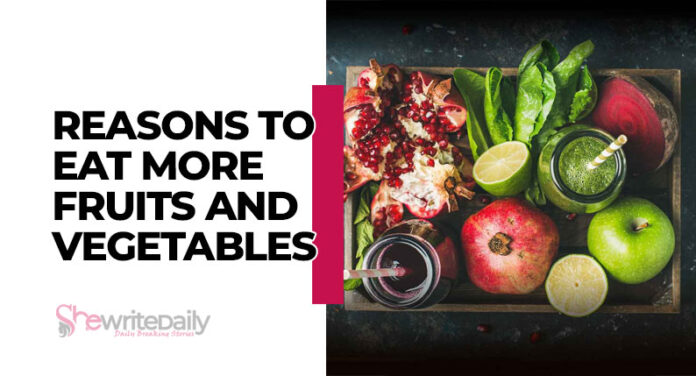In today’s fast-paced world, maintaining a healthy lifestyle has become crucial. One of the key aspects of a healthy lifestyle is a well-balanced diet that includes a variety of fruits and vegetables. These natural wonders offer numerous benefits, particularly for our digestive system.
Let’s explore the top twelve reasons why incorporating more fruits and vegetables into your diet can enhance your overall well-being.
Benefits of Fruits and Vegetables
1. Fruits and vegetables are a great source of vitamins and minerals.
Fruits and vegetables are packed with essential vitamins and minerals that are vital for our body’s optimal functioning. These nutrient powerhouses provide a rich source of nutrients, including vitamins A, C, and E, as well as minerals like potassium and magnesium. By incorporating a wide variety of fruits and vegetables into your diet, you ensure you receive a diverse range of nutrients to support your overall health.
2. You get to enjoy a variety of flavors and textures.
One of the joys of eating fruits and vegetables is their wide array of flavors and textures. From the crisp sweetness of apples to the juicy tanginess of oranges and from the earthy goodness of spinach to the crunchy freshness of bell peppers, there’s something to suit every taste bud. Exploring the vibrant world of fruits and vegetables adds excitement and variety to your meals.
3. Boosts immunity.
Fruits and vegetables are known for their immune-boosting properties. They are rich in antioxidants, which help protect the body from harmful free radicals and strengthen the immune system. The immune-boosting power of fruits and vegetables helps your body fight off infections and reduces the risk of chronic diseases.
4. Strengthens bones.
Many fruits and vegetables are excellent sources of bone-strengthening nutrients such as calcium, magnesium, and vitamin K. These nutrients play a vital role in maintaining strong and healthy bones. Regularly consuming fruits and vegetables can help reduce the risk of osteoporosis and other bone-related disorders.
5. Lots and lots of fiber.
Fiber is essential for a healthy digestive system, and fruits and vegetables are excellent sources of dietary fiber. Fiber adds bulk to your diet, aids in digestion, and promotes regular bowel movements. It also helps you feel full and satisfied, making it easier to maintain a healthy weight.
6. They’re low-calorie and low-fat.
Fruits and vegetables are naturally low in calories and fat, making them ideal for weight management. They provide essential nutrients without the added calories or unhealthy fats found in many processed foods. Including a variety of fruits and vegetables in your meals can help you maintain a healthy weight and prevent obesity-related health issues.
7. Protect against cancer and other diseases.
A diet rich in fruits and vegetables is associated with a reduced risk of various types of cancer, including lung, mouth, stomach, and colorectal cancer. The phytochemicals present in fruits and vegetables have antioxidant and anti-inflammatory properties that help protect against cell damage and inhibit the growth of cancer cells. Additionally, the high fiber content in these foods aids in preventing digestive disorders and reducing the risk of heart disease, diabetes, and other chronic diseases.
8. Fruits and vegetables help you maintain good health.
The nutrients present in fruits and vegetables contribute to overall good health. They support the functioning of vital organs, strengthen the immune system, and provide energy for daily activities. You promote optimal health and well-being by including a wide variety of fruits and vegetables in your diet.
9. Low in sodium and cholesterol.
Fruits and vegetables are naturally low in sodium and cholesterol, making them heart-healthy choices. High sodium intake is linked to increased blood pressure and the risk of heart disease. You can protect your cardiovascular health by replacing processed foods high in sodium and cholesterol with fresh fruits and vegetables.
10. Fresh, frozen, canned, dried are ALL nutritious.
While fresh fruits and vegetables are often considered the best choice, frozen, canned, and dried options can also provide valuable nutrients. These alternatives offer convenience and can be enjoyed when certain fruits and vegetables are out of season. Just be cautious of added sugars or excessive sodium in canned or dried products, and opt for those without added ingredients.
11. Convenient, quick, and easy.
In our busy lives, convenience significantly influences our food choices. Fruits and vegetables are incredibly convenient as they require little to no preparation. They can be enjoyed as a snack on the go, added to salads, or incorporated into various recipes with minimal effort. By making fruits and vegetables easily accessible, you can maintain a nutritious diet even during hectic days.
12. Fresh Smoothies!
Smoothies offer a delightful and refreshing way to enjoy a blend of fruits and vegetables. You can create delicious smoothies packed with nutrients with a good blender and a dash of creativity. Adding ingredients like spinach, berries, and bananas to your smoothies provides a tremendous boost of vitamins, minerals, and antioxidants, making them a fantastic quick and nutritious meal or snack option.

FAQs
What are the best ways to incorporate fruits and vegetables into my diet?
Answer: You can include fruits and vegetables in your diet by adding them to salads, smoothies, or snacks. Aim to have a variety of colors on your plate to ensure a diverse nutrient intake.
Can I meet my nutritional requirements by consuming only canned or frozen fruits and vegetables?
Answer: While canned and frozen fruits and vegetables retain some nutritional value, fresh produce is generally the optimal choice. New options provide higher levels of nutrients and fewer additives.
Can fruits and vegetables help with weight loss?
Answer: Yes, fruits and vegetables are low in calories and high in fiber, making them excellent choices for weight loss. They provide essential nutrients while keeping you full and satisfied.
Are smoothies a healthy option for consuming fruits and vegetables?
Answer: Smoothies can be a convenient and nutritious way to include fruits and vegetables. However, be mindful of the added sugars and portion sizes to maintain a healthy balance.
Are any specific fruits or vegetables particularly beneficial for digestive health?
Answer: Certain fruits and vegetables, such as bananas, apples, berries, broccoli, and leafy greens, are known to be beneficial for digestive health due to their fiber content and other nutrients.
Conclusion
Incorporating more fruits and vegetables into your diet benefits your digestive system and overall health. Their low-calorie, low-fat nature, combined with their high fiber content, promotes healthy digestion, helps in weight management, and reduces the risk of various diseases. Simple dietary and lifestyle changes can enhance your digestive well-being and help you enjoy a healthier, more vibrant life.


